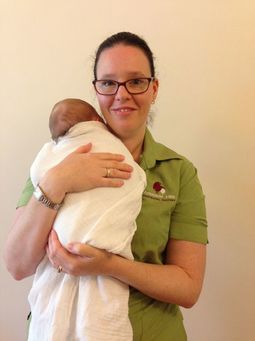As part of my Postnatal Support service, I can help with:
|
|

People will tell you: ‘Sleep when the baby sleeps’, ‘Forget the housework’, ‘Enjoy this time’. When you spend most of your waking hours feeding, winding, changing and soothing your baby, any time they are asleep you might be emptying the bins, doing essential laundry, washing up, or taking a shower. It can be hard to get any rest at all, even when you’re only doing the bare minimum around the house.
If this is not your first baby, then you will know all too well how much work a new baby creates. Even though you will find things much easier with second or subsequent babies, you have the added workload of sibling/s to care for and it’s a daunting thought!
Imagine how reassured you would feel if when you came home from hospital I was there to settle you in and then again a day or two later to clean up the kitchen and rock the crying baby whilst you have a much needed shower! I relish the opportunity to use my specialist skills to help Mums, as well as providing affordable domestic help all within one service. Let me relieve some of the stress you may feel from multitasking, leaving you free to really enjoy your baby’s first weeks and months, instead of merely surviving them! I’ll also keep in touch regularly between visits so that I can answer any questions or worries: no question is a silly question!
I generally only take on two-three regular clients at a time so that I can give you the quality support that you need. However, I can usually squeeze in visits to help Mums with breastfeeding emergencies for one or two visits at any time. I am kind, friendly, energetic, and straightforward. I’m not in the least bit intimidating and I work like a Trojan.
What are the benefits of professional support during the Postnatal Period?
Society leads us to believe that motherhood, and in particular breastfeeding, will come ‘naturally’ – but this is not the case. A mother’s instinct is a powerful thing; but it is not a mother’s instinct that tells you how to breastfeed your baby or how to recognise when they are tired. These are learned skills. The reason we think of them as natural is because in recent generations they felt natural. Women grew up within larger and extended families and close-knit communities, observing other women in labour, feeding and calming their babies and participating in child care duties themselves. When it was their turn to have a baby, they knew roughly what to do!
For millennia, all around the world, women have been cared for by their families and communities after they give birth, usually for periods of two to six weeks. During the traditional ‘lying in’ period, the mother remains in and around her bed, doing nothing but eating, sleeping, feeding and changing her baby.
The lying in period serves a physiological purpose. It speeds a woman’s physical and mental recovery from birth, helps establish plentiful lactation, promotes bonding and gives the baby’s immature nervous system time to acclimatise to life outside the womb, rather than exposing him to too many sensory experiences and new people.
In stark contrast is our culture, where it is not unusual for a woman to have rarely even held a baby before she has her own, let alone know how to breastfeed one. Few mothers choose or even have the option to stop and rest after giving birth. As our community bonds have been eroded, becoming a mother can be, for many women, a very lonely and overwhelming experience.
Some of the most common complaints of new Mums and Dads are:
‘Why did no one tell me it would be this hard?’
‘I was woefully underprepared for parenthood’
‘Why were antenatal classes mainly about labour? Labour only lasts one day- being a mother is for life!'
Well, in fact research has shown that it is very difficult to get first time Mums to focus beyond the birth. No matter how much we try to prepare them, because they are hyper-focused on birth (since as I mentioned above, birth is now something that mostly happens in private in a hospital, most women have no experience of birth before they go into labour), their thoughts continually return to how on earth they are going to get this baby out!
|
In addition, we women have done ourselves a massive disservice in cultivating the myth of the superwoman. We think we can be everything, do everything and have everything. We can be wives, mothers, career women, grow our own organic veggies, maintain an active social life, make time for ourselves, exercise, be fit, sexy and well dressed, have a clean house….the list goes on! We have enormous unrealistic expectations of ourselves, and one of those is that after we have a baby we have to get ‘back to normal’ straight away and just carry on with everything.
A postnatal doula or support person can go at least part way to replace the community support that we generally lack. Doulas of North America report that women who have a postnatal doula:
I’ll help you be kind to yourself and recognise when you are setting your expectations too high. |
Are you unsure whether your newborn baby needs to be in a routine?
Breastfed babies need to be fed on demand and most parents are quite well informed about this. However, most new parents don't know how to recognise when their baby is tired or how to help them to fall asleep.
You’ll usually be sent home from hospital with leaflets on breastfeeding and safe sleep practices to reduce the risk of SIDS, but parents are rarely given any guidance on how often and how long newborns need to sleep. This leads people to turn to books by self-styled ‘experts’, many of whom don’t even have children! The schedules in these books are not suitable for newborn babies!
Trying to follow a strict ‘one size fits all’ routine from a book with a breastfed baby goes against the physiology of breastfeeding and can cause problems with milk supply. Nonetheless, many newborn babies are chronically overtired because of the lack of trustworthy professional information out there on appropriate sleep patterns. Being overtired can have knock on effects on a baby’s ability to feed effectively and increases crying significantly. They will naturally fight sleep because all they know is they feel awful and are trying to escape that feeling of tiredness. They need us to help them to wind down and learn that tiredness leads to falling asleep feeling secure.
I’ll help you to observe your baby’s own natural rhythms and then tweak things a little here and there to maximise sleep for the whole family, whilst also keeping you grounded with realistic expectations of what is ‘normal’ for a young baby – i.e. there is no routine but there may be patterns, no one gets a great deal of sleep and they feed an awful lot!
For more information on how I help Mums of older babies get into a gentle flexible routine have a look at the Older Babies and Toddlers Page. I advocate baby-led feeding and baby-led routines, which are based on the baby’s age and personality type.
Are you finding it hard to move forward positively after your birth experience?
|
Even if you have had a good birth experience, it is normal to replay your labour and baby’s birth over and over again in your head – it was such a momentous occasion and something you had anticipated for so long; it takes time process the experience. Therefore, it is equally to be expected that if you have had a disappointing, unexpected or traumatic birth experience it may take longer to mentally process what happened. Talking through your birth experience with an experienced person is known as ‘debriefing’ and can help greatly. One of the benefits of debriefing with a midwife is I can explain why certain things might have happened and if anything could have changed events. Also, when you tell me what happened during your labour, I can (almost) guarantee I will have seen all the events numerous times over and can truly comprehend the enormity of what you’ve been through. Have a browse through my blog articles to find more useful information on mental wellbeing. |


